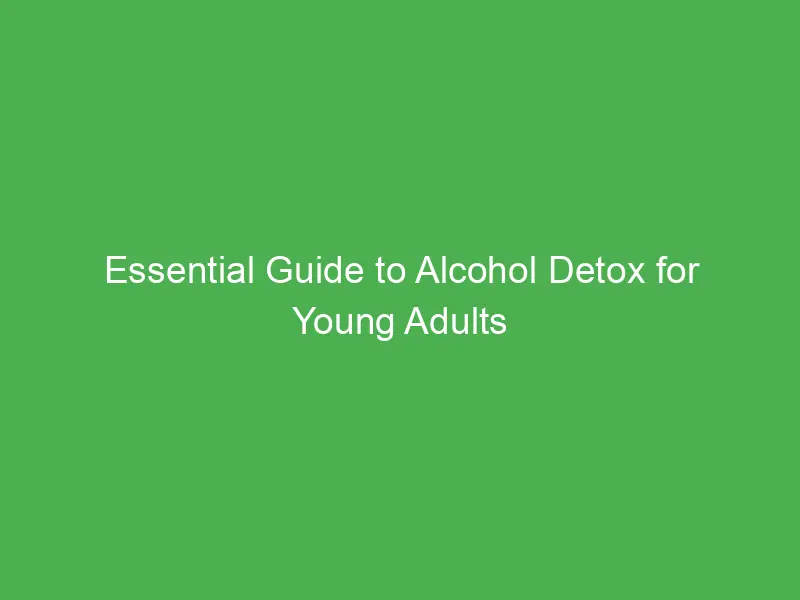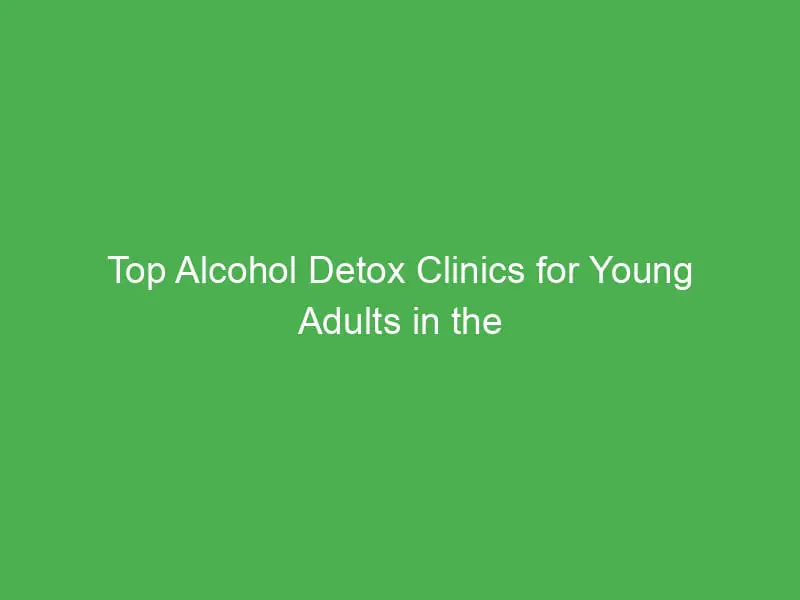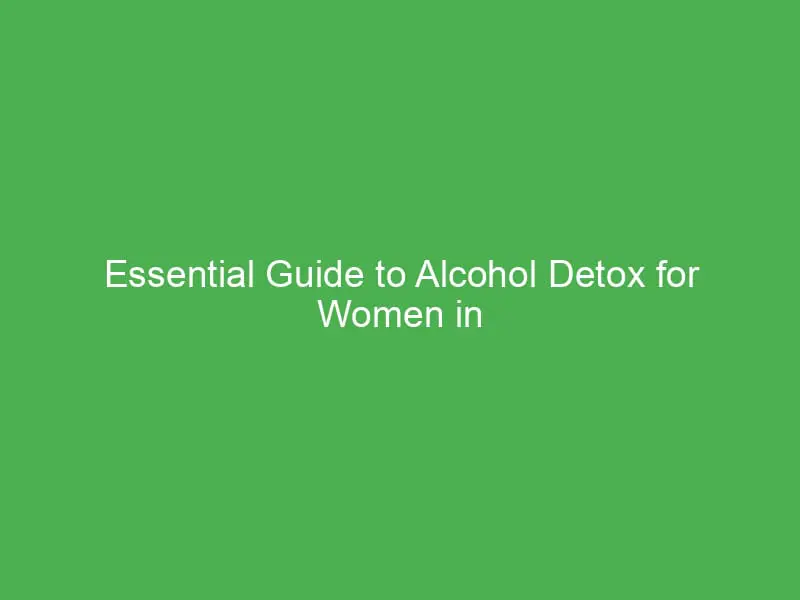Navigating the path to sobriety can be particularly challenging for young adults in Canada, where social norms often celebrate alcohol consumption. As the pressures of modern life mount, many are seeking effective ways to detox and reclaim their health. Understanding the nuances of alcohol detox is essential for those looking to break free from dependency and foster a healthier lifestyle.
In Canada, various programmes and resources cater specifically to the needs of young adults, offering tailored support and guidance. From holistic approaches to medical interventions, these options empower individuals to embark on their detox journey with confidence. Exploring these avenues not only aids in recovery but also paves the way for a brighter, alcohol-free future.
• What is alcohol detox for young adults in Canada?
Alcohol detox refers to a structured process that helps individuals safely withdraw from alcohol after prolonged use. For young adults in Canada, this process is especially crucial given the unique challenges they face regarding alcohol consumption.
Steps Involved in Alcohol Detox
- Assessment: Individuals undergo a comprehensive evaluation by healthcare professionals. This assessment helps identify the severity of alcohol use and any co-occurring mental health issues.
- Medical Supervision: Detox generally occurs under medical supervision to manage withdrawal symptoms safely. This supervision can take place in inpatient or outpatient settings, ensuring that support is available around the clock.
- Withdrawal Management: Withdrawal symptoms can range from mild to severe. Common symptoms include anxiety, tremors, and nausea. Medical staff may administer medications to alleviate these symptoms and facilitate a more comfortable experience.
- Emotional Support: Alongside physical withdrawal management, emotional support is vital. Therapists and support groups provide counselling, helping individuals process feelings and cope with cravings.
- Holistic Approaches: Many programmes incorporate holistic methods, such as yoga, meditation, or nutritional guidance. These approaches aim to promote overall well-being, enhance mental health, and ease the detox process.
- Aftercare Planning: Once detox is complete, comprehensive aftercare planning is essential for long-term recovery. This may include follow-up therapy, support groups, or lifestyle changes aimed at maintaining sobriety.
Understanding the intricacies of alcohol detox can empower young adults in Canada to make informed decisions about their health. With the right resources and support, individuals can transition to a healthier, alcohol-free lifestyle.
• Benefits of alcohol detox for young adults in Canada
- Improved Physical Health: Alcohol detox can lead to significant health improvements. Young adults often experience enhanced liver function, improved cardiovascular health, and better digestion. Regular detox can also reduce the risk of alcohol-related diseases.
- Mental Clarity: Stripping away alcohol can enhance cognitive function. Young adults report clearer thinking, improved concentration, and better memory. This mental clarity can lead to greater productivity in studies and work.
- Emotional Stability: Alcohol consumption can amplify mood swings and anxiety. Detox helps individuals regain emotional balance. Many young adults find that sobriety allows them to process emotions more healthily and reduces feelings of depression.
- Better Sleep Patterns: Alcohol disrupts normal sleep cycles. Following detox, young adults often enjoy improved sleep quality, leading to increased energy levels during the day. Restorative sleep contributes to overall health and well-being.
- Enhanced Relationships: Detoxing can improve personal relationships. Sobriety allows young adults to reconnect with friends and family, fostering stronger bonds. Trust and communication improve when alcohol no longer hinders interactions.
- Strengthened Coping Skills: Detox programmes often include counselling, which teaches effective coping strategies. Young adults learn to manage stress, anxiety, and social pressures without resorting to alcohol.
- Increased Life Satisfaction: Many young adults find renewed purpose and motivation after detox. An alcohol-free lifestyle often opens up new opportunities for personal growth, hobbies, and fulfilling experiences.
- Access to Support Networks: Engaging in detox programmes connects young adults to supportive communities. Participating in group sessions provides a sense of belonging and shared understanding, vital for long-term recovery.
- Financial Savings: Regularly consuming alcohol can be costly. Young adults often notice significant savings after detox. The funds previously spent on drinking can be redirected towards healthier pursuits, such as travel and education.
Each benefit reinforces the overall positive impact of alcohol detox on young adults’ lives, enabling them to embark on healthier, more fulfilling journeys.
• How to Find the Best alcohol detox for young adults in Canada
- Research Online Detox Options
Research various alcohol detox centres in Canada by exploring their websites. Look for specific information about their programmes, approaches, and success rates. Online reviews and testimonials provide valuable insights into the experiences of past participants.
- Check Accreditation and Credentials
Verify that detox facilities are accredited and staffed by qualified healthcare professionals. Certifications from reputable organisations ensure that the centre meets established standards of care.
- Evaluate Treatment Methods
Assess the treatment methods offered by different centres. Comprehensive programmes should combine medical supervision, therapeutic support, and holistic approaches. Options like counselling, yoga, and nutritional guidance can enhance the detox experience.
- Consider Location and Environment
Choose a facility that fits the individual’s preferences, whether it’s a serene location amidst nature or a more urban setting. The environment can significantly impact comfort and overall recovery success.
- Inquire About Aftercare Services
Inquire about aftercare support available after the detox programme. Effective aftercare, including ongoing counselling and support groups, is crucial for ensuring long-term sobriety and health.
- Assess Costs and Insurance Coverage
Evaluate the costs of various programmes and what services are included. Check if the facility accepts insurance, which can alleviate financial pressure. Many centres offer payment plans or sliding scale fees.
- Seek Recommendations
Consult healthcare professionals or trusted individuals who have experience with detox programmes. Personal recommendations can lead to trustworthy options tailored to young adults’ needs.
- Visit Facilities
If possible, visit potential detox centres before making a decision. Meeting staff and touring the facility helps gauge the environment and determine if it’s a suitable fit.
By following these steps, young adults in Canada can effectively navigate the process of finding an appropriate alcohol detox programme that supports their recovery journey.
• Best Practices for alcohol detox for young adults in Canada
- Consult a Healthcare Professional
Consulting a healthcare professional is crucial before starting an alcohol detox. Professionals can assess individual needs, recommend suitable detox methods, and identify any co-occurring mental health issues that require attention.
- Choose a Suitable Programme
Choosing a suitable detox programme that fits personal preferences and needs is essential. This may include inpatient or outpatient options, allowing flexibility while ensuring safety through medical supervision.
- Establish a Support Network
Establishing a support network of family, friends, or support groups can significantly impact the detox journey. Engaging with others who understand the challenges associated with alcoholism promotes emotional stability and accountability.
- Embrace Healthy Lifestyle Changes
Embracing healthy lifestyle changes, such as regular exercise, nutritious meals, and adequate sleep, aids the detox process. Physical well-being complements emotional health, making recovery more effective.
- Avoid Triggers
Avoiding alcohol triggers—people, places, or situations associated with drinking—is vital during detox. Identifying and steering clear of these triggers can help prevent relapse.
- Practise Mindfulness and Stress Management
Practising mindfulness techniques, such as meditation, yoga, or deep breathing, can be beneficial. These practices encourage relaxation and reduce stress, making the detox process smoother.
- Stay Informed
Staying informed about the detox process and potential withdrawal symptoms can mitigate anxiety. Understanding what to expect allows for better preparation and coping strategies.
- Plan Aftercare
Planning for aftercare is crucial for long-term sobriety. This includes scheduling follow-up appointments, joining support groups, and exploring ongoing therapy options to maintain motivation and support.
- Set Realistic Goals
Setting realistic and achievable goals during detox helps build confidence. Small victories contribute to a sense of accomplishment, reinforcing a commitment to recovery.
These best practices empower young adults in Canada to navigate alcohol detox effectively, ensuring a safer and more supportive recovery journey.
• Common Challenges with alcohol detox for young adults in Canada
- Withdrawal Symptoms: Young adults often experience uncomfortable withdrawal symptoms, including anxiety, tremors, and nausea. These symptoms can vary in intensity and duration, making medical supervision crucial during detox.
- Social Pressures: In a culture that frequently normalises drinking, young adults may face social isolation or peer pressure to consume alcohol. This can complicate the detox process, leading to feelings of loneliness or the temptation to relapse.
- Emotional Turmoil: Emotional challenges may arise, such as mood swings or depression. Young adults might struggle to manage these emotions without alcohol, emphasising the need for counselling and emotional support throughout detox.
- Financial Considerations: Cost can be a significant barrier. Many detox programmes involve expenses that young adults may find challenging to navigate, making it essential to explore options including community-based services and insurance coverage.
- Access to Resources: Young adults may have difficulty locating suitable detox resources, especially in rural areas. Limited availability of specialised programmes can hinder timely access to essential treatment.
- Stigma Around Addiction: Stigma can deter young adults from seeking help. Fear of judgement or misunderstanding about addiction can prevent them from accessing support networks, crucial for recovery.
- Commitment to Change: The motivation to remain alcohol-free can wane over time. Establishing clear personal goals and a strong support system is essential for maintaining focus and fostering accountability.
- Pre-existing Conditions: Co-occurring mental health conditions often complicate detox. Addressing these alongside alcohol withdrawal requires a comprehensive approach from qualified professionals.
- Sustaining Motivation: Young adults may initially feel enthusiastic about detox, but sustaining that motivation can be challenging. Engaging in sober-friendly activities, connecting with supportive peers, and celebrating small victories can help maintain motivation over the long term.
Key Takeaways
- Understanding Alcohol Detox: Alcohol detox for young adults in Canada is a structured process to safely withdraw from alcohol, essential for managing unique challenges related to consumption in this demographic.
- Comprehensive Evaluation: A thorough assessment by healthcare professionals is crucial for developing personalised detox strategies that address both alcohol dependency and any co-occurring mental health issues.
- Benefits of Detox: The detox process leads to improved physical and mental health, emotional stability, better relationships, and increased life satisfaction, making it a vital step for long-term recovery.
- Choosing the Right Programme: When selecting an alcohol detox programme, consider aspects such as medical supervision, holistic approaches, aftercare services, and the facility’s accreditation and environment.
- Best Practices for a Successful Detox: Engaging with a support network, embracing healthy lifestyle changes, avoiding triggers, and setting realistic goals are key strategies that support successful detox and promote long-term sobriety.
- Addressing Common Challenges: Awareness of withdrawal symptoms, social pressures, emotional turmoil, and stigma around addiction is vital for young adults to navigate the detox process effectively and sustain motivation throughout their recovery journey.
Key Takeaways: Alcohol Detox Essentials for Young Adults in Canada
Alcohol detox presents a vital opportunity for young adults in Canada to reclaim their health and well-being. By embracing this process they can overcome the challenges posed by societal pressures and personal struggles with alcohol. With the right support systems in place including professional guidance and holistic practices they can navigate their detox journey more effectively.
The benefits of detox extend beyond immediate physical health improvements. Young adults often experience enhanced mental clarity and emotional stability leading to better relationships and life satisfaction. As they embark on this transformative path it’s crucial for them to remain informed and proactive about their choices. By prioritising their recovery and utilising available resources they can build a healthier, alcohol-free future.
Frequently Asked Questions
What challenges do young adults in Canada face during sobriety?
Young adults in Canada often encounter social pressures to consume alcohol, leading to challenges in maintaining sobriety. Additionally, they may experience uncomfortable withdrawal symptoms, emotional turmoil, and potential stigma surrounding addiction. Financial constraints and access to support resources can further complicate their detox journey.
Looking for more sober travel inspiration? Find your next adventure on our Homepage.
What does alcohol detox involve for young adults?
Alcohol detox for young adults is a structured process that includes a comprehensive assessment by healthcare professionals, medical supervision to manage withdrawal symptoms, and emotional support through counselling. It aims to safely help individuals withdraw from alcohol after prolonged use while focusing on overall well-being.
What are the benefits of alcohol detox for young adults?
The benefits of alcohol detox include improved physical health, enhanced mental clarity, emotional stability, and better sleep patterns. Young adults may experience strengthened relationships, increased coping skills, and a renewed sense of life satisfaction. Detox also leads to financial savings from reduced alcohol consumption.
How can young adults find suitable alcohol detox programmes in Canada?
To find suitable detox programmes, young adults should research options online, check the accreditation of facilities, and evaluate available treatment methods. It’s important to consider location, aftercare services, costs, and insurance coverage while also seeking recommendations from healthcare professionals.
What best practices should young adults follow during alcohol detox?
Best practices include consulting a healthcare professional to tailor the detox approach, building a support network, and embracing healthy lifestyle changes. Young adults should also avoid triggers, practice mindfulness, stay informed about the detox process, and plan for aftercare to foster long-term sobriety.
What common challenges might young adults face during detox?
Common challenges during detox include uncomfortable withdrawal symptoms, social pressures to drink, and emotional distress. Financial limitations and access to resources, particularly in rural areas, can also pose significant obstacles. Additionally, the stigma of addiction may prevent individuals from seeking necessary help.

Quit drinking on 23 July 2021 after a two-day bender and swapped bars for border crossings and 12-step meetings. Three sober years, 36 countries, 113 travellers (totally dry), fuelled by street food, jelly babies, and a broken Google Maps app. Wandersober is my journal, my SEO lab, and my mission. Featured in GQ, Mirror, Evening Standard, MarketWatch, and more.






